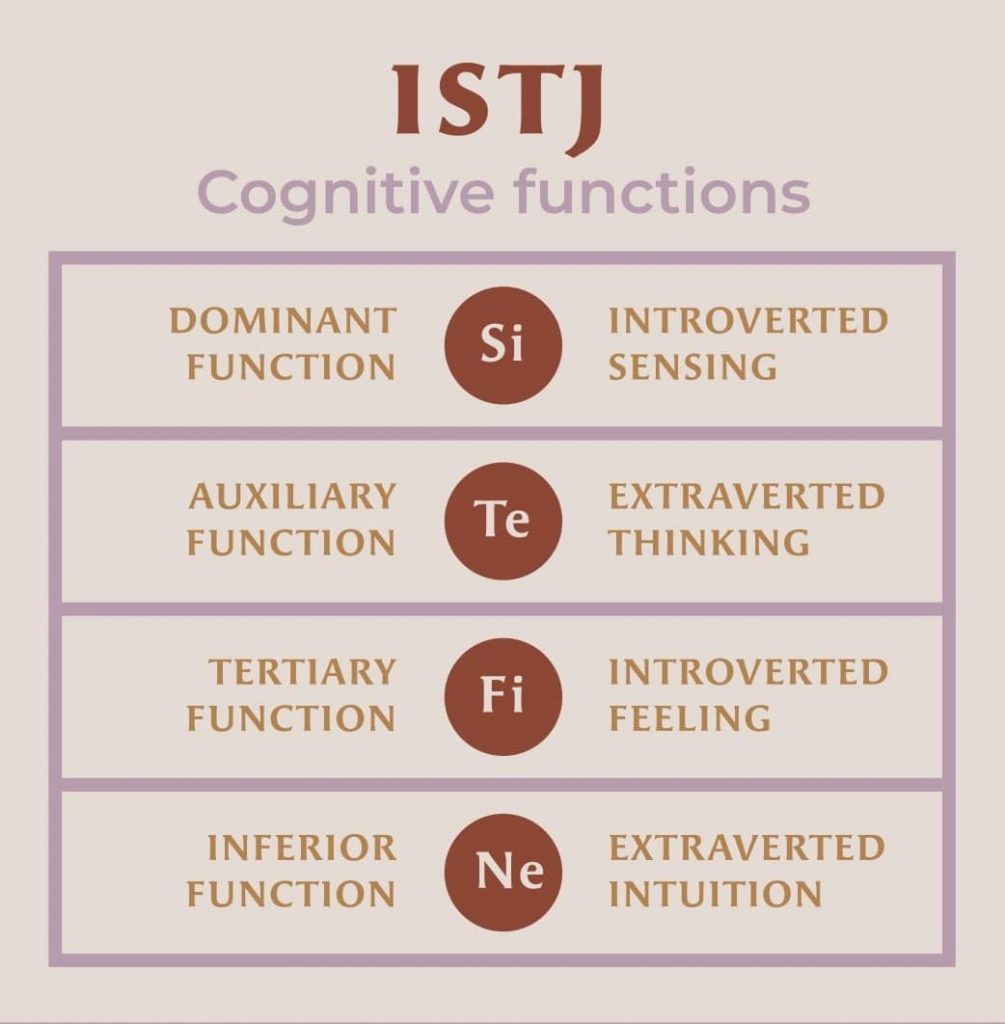ISTJ – The Logistician
Contents
ISTJ Meaning:
The ISTJ personality type is an eclectic combination with – Introvert, Sensing, Thinking & Judgement. ISTJ’s are relatively common compared to the other 15 personality types, consisting of approximately 12 percent of the population. Interestingly, the ISTJ personality type is much more common amongst men than women, with 16 percent of men being an ISTJ, as opposed to women at a much lower 7 percent.
Generally, ISTJ’s are profoundly & fiercely loyal. They expect honesty & transparency in all aspects of their lives. Whether personally or professionally, being anything less than forthcoming with an ISTJ will result in a breach of trust that can be extremely difficult to recover from.
ISTJ’s are also very methodical. Appealing to their Sensing & Thinking preferences, they tend to both seek and create order in the world around them. They identify and highlight patterns very quickly, almost obsessively so. They appeal to law & order above all else. Whether it be in their relationships, their workplace, or waiting in line at the grocery store, they are keen to observe (and even enforce) the rules when necessary, whether they are spoken or unspoken. The ISTJ’s perspective on the world may be starkly black & white, with little to no opportunity for grey. This perspective and approach can be a serious point of contention and resentment for the more Feeling personality types. However, it can come as a refreshing and welcome breath of honesty for others.
Given this, ISTJ’s also tend to be highly critical and blunt. The ISTJ often does not consider (or even necessarily notice) how their criticism or feedback may be construed. To the ISTJ, their opinion is nothing more than a matter of fact simply based on data, logic, and facts. Feelings, therefore, do not tend to be a primary point for consideration. ISTJs rarely dance around potentially difficult subjects or conversations to protect or avoid hurting other personality type’s feelings. This perceived insensitivity is especially true if it means that, in doing so, the complete and entire truth is at all compromised. ISPTs may be direct and can be brutally honest at times; however, they would expect nothing less from those around them in return.
In terms of lifestyle, ISTJ’s are typically very traditional and are often commonly perceived as being conservative. They appreciate and take great pride and satisfaction in establishing and maintaining order and organization in all aspects of their lives.
ISTJ’s tend to be very neat, tidy, and particular in their homes. Every single item must have both a specific purpose as well as a specific place. Although this makes for a highly organized, streamlined, and functional household, any deviation from this system can quickly cause anxiety, stress, and frustration for the ISTJ that others would consider to be irrational. A small item out of place has a more substantial effect on the ISTP than other personality types (the Intuitive (N) types in particular).

ISTJ’s and Career:
Professionally, ISTJs are usually highly respected, renowned, and successful. Although their earnest deposition does not necessarily lend itself to the typical office or team environments, their almost zealous practicality, dependability, and responsibility certainly do. It is not surprising that ISTJs thrive in work environments where there are clear and defined rules, regulations, and procedures. This affinity for organization allows the ISTJ to focus on the task at hand instead of being distracted or bogged down by potentially disorganized or ‘lax’ workplaces and practices.
ISTJ’s as Direct Reports:
As direct reports within a team or corporate structure, ISTJ’s tend to carry out an assignment doggedly and without exception. ISTJ’s take great pride in seeing a project or task brought to completion, especially when their leaders provide a clear and concise direction. ISTJs are extremely detail-oriented, which is a particularly precious asset when considered with their analytical constitution.
ISTJ’s as Leaders of Others:
As a leader of others, ISTJ’s are primarily result-driven. They are highly goal-oriented and will logically build and execute an action plan to achieve these goals. This laser-focus and intensity is indeed a premium quality in a corporate and business setting; however, those reporting to an ISTJ may find their manner and style to be potentially challenging and intrusive. Therefore, it is essential to balance the cerebral tenacity of the ISTJ with more Feeling and Perceiving personality types.
However, a potential pitfall for the ISTJ is that they tend to reward and celebrate those who achieve goals and follow the established structure and norm. While excellent for maintain status quo at any given work environment, this also strangles out any potential for innovation or creativity. If not careful, this can result in a company that is successful for the time being, but fades into obscurity in time, as they are not able to adapt and respond to change.
ISTJ Professions:
The ISTJ personality type has the capacity to work well within a multitude of industries and professions given the bureaucratic nature of the type.
Unsurprisingly, ISTJ’s gravitate towards the office and administrative support fields and positions. These positions appeal to their methodical and orderly approach to the world and can include Office Clerks, Postal Service works, Services Manager as well as Bookkeeping.
Also, The ISTJ is highly detail-oriented and precise, which lends itself extremely well to Business and Financial careers, such as Accounting, Budgeting, Financial Analysts Real Estate, or Tax Examiner.
Lastly, given the ISTJ’s propensity for law and order, they would make natural fits for protective service and law, including Police or Military Officer, correctional Officer, Lawyer, Judge, as well as Paralegal or Legal Assistants.
While the ISTJ has many options for careers, they should be careful when looking into careers or professions which may not appeal to their natural strengths. These would include any profession where the role or the environment is not rigid or well defined, and more prone to volatility. Examples of professions that are not ideal for the ISTJ include photographer, Actor, Art Director, Musician, and artist. It is important to note that although these professions may not appeal to the ISTP’s natural tendencies, it does not mean that they would not be successful in any of them, however, it is highly likely that they would require extra care and diligence.
ISTP’s in Friendships:
In friendships, ISTJ’s are staunchly dutiful. It is indeed challenging to gain an ISTJ’s trust and affection. However, once earned, it is intense and deeply rooted. They are dependable and reliable, being the first to jump in to help whenever it is needed and the last to leave until the job is complete. This dependability is perfect when looking for friends to help move; however, ISTJ’s are also the first to offer their criticism and feedback as well, even when it has not necessarily been requested (nor warranted). As such, ISTP’s are often labeled as being judgmental and critical. ISTP’s offer their opinions, not for the sake of being critical or cynical; rather instead, they passionately believe the old adage that ‘feedback is a gift.’ What’s more, the style that it is communicated in is quite commonly frank and forthright, which can be especially difficult for those personality types that appreciate their feedback to be gentle or sugar-coated.
ISTJ’s can also be considerably stubborn in their thoughts and opinions. It is almost guaranteed that an ISTJ has reached any given belief or opinion through rigorous and analytical research and thought on their part. Therefore, they do not easily budge on their ideas or opinions. That is not to say that they are not open to new information or ideas that could change theirs; however, it is best to present it in a well-thought-out, detailed, and logical manner. In this respect, ISTJ’s can be acutely pragmatic.
ISTJ’s in Romantic Relationships:
In romantic relationships, ISTJ’s are devout, committed, and stable. As with other associations, ISTJ’s value honesty above all else. This is the foundation of meaningful relationships and takes time and effort to build, nurture and establish.
Once in a relationship, ISTJ’s are loyal almost to a fault. This fierce loyalty comes from their natural affinity towards tradition. Tradition is an established and conventionally agreed-upon set of rules and ‘dos and don’ts.’ This appeals to the ISTJ’s strong preference for order and consistency. As such, ISTJ’s will devote themselves to honor this commitment resolutely.
If in a relationship with other personality types that value loyalty, the bond can be nearly unbreakable. However, similar to how they approach their home, the effects are often drastic and potentially irreversible if there is any deviation in this order. A disruption in the relationship’s stability or any type of conflict will almost certainly result in unnecessary stress and a negative response from the ISTP. Given their Introverted preference, they may therefore withdraw inside themselves and obsess about the issue until they can logically make sense of it to their own satisfaction. This distancing is particularly dangerous when in a relationship with a personality type that prefers to primarily speak and talk through conflict.
This withdrawal and shutting down can also lead to pessimism. ISTJ’s can be particularly hard on themselves when things do not go according to plan. This self-blame can be frustrating both for the ISTJ and their partner. It is vital to allow the ISTJ the necessary time and space they require to rationalize and consider the problem; however, it is also essential to ensure this does not result in the ISTJ becoming detached from the relationship entirely.
The need for a routine and stability does indeed contribute to a successful relationship. It reduces potential for volatility and uncertainty, however, in doing so, it can also result in a certain lack of spontaneity or excitement in the relationship.

ISTJ’s and Family:
ISTJ’s can make potentially excellent parents, as they tend towards responsibility, practicality, and order, which naturally lend to traditional means of raising children. This temperament indeed works well for the most part; however, the ISTJ’s tendency to be stubborn and strong-willed can result in the potential for resistance or rebellion from the child or children as well.
Overall, the ISTJ personality type can be highly successful in all areas of their lives, whether it be in their profession, relationships, or family. They can achieve even the near impossible when given the proper context and environment. Their loyalty and conscientiousness are indeed one of their greatest strengths and are pillars of responsibility and reliability. Although they can be misunderstood in their approach and demeanor, the ISTJ can almost always be counted upon, to be honest, reliable, dependable, and provide essential stability in all aspects of their lives.
You can find information on famous people with ISTJ personality types such as celebrity actors, sportsmen, characters and other historical characters with this personality type.







